The Introduction of Guo Moruo郭沫若英文介绍
- 格式:ppt
- 大小:1.51 MB
- 文档页数:12
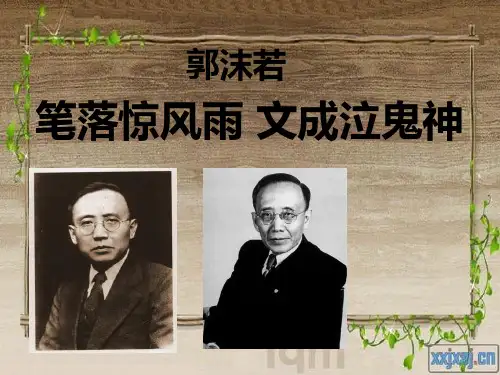
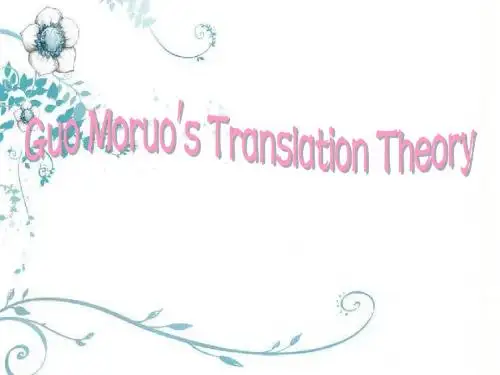
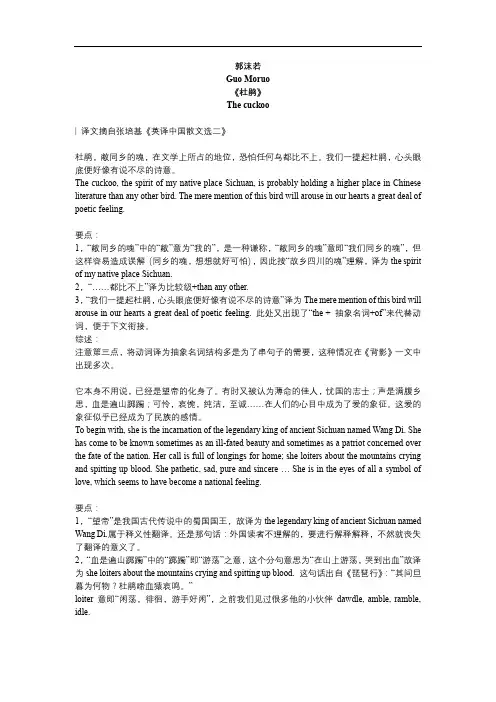
郭沫若Guo Moruo《杜鹃》The cuckoo| 译文摘自张培基《英译中国散文选二》杜鹃,敝同乡的魂,在文学上所占的地位,恐怕任何鸟都比不上。
我们一提起杜鹃,心头眼底便好像有说不尽的诗意。
The cuckoo, the spirit of my native place Sichuan, is probably holding a higher place in Chinese literature than any other bird. The mere mention of this bird will arouse in our hearts a great deal of poetic feeling.要点:1,“敝同乡的魂”中的“敝”意为“我的”,是一种谦称,“敝同乡的魂”意即“我们同乡的魂”,但这样容易造成误解(同乡的魂,想想就好可怕),因此按“故乡四川的魂”理解,译为the spirit of my native place Sichuan.2,“……都比不上”译为比较级+than any other.3,“我们一提起杜鹃,心头眼底便好像有说不尽的诗意”译为The mere mention of this bird will arouse in our hearts a great deal of poetic feeling. 此处又出现了“the + 抽象名词+of”来代替动词,便于下文衔接。
综述:注意第三点,将动词译为抽象名词结构多是为了串句子的需要,这种情况在《背影》一文中出现多次。
它本身不用说,已经是望帝的化身了。
有时又被认为薄命的佳人,忧国的志士;声是满腹乡思,血是遍山踯躅;可怜,哀惋,纯洁,至诚……在人们的心目中成为了爱的象征。
这爱的象征似乎已经成为了民族的感情。
To begin with, she is the incarnation of the legendary king of ancient Sichuan named Wang Di. She has come to be known sometimes as an ill-fated beauty and sometimes as a patriot concerned over the fate of the nation. Her call is full of longings for home; she loiters about the mountains crying and spitting up blood. She pathetic, sad, pure and sincere … She is in the eyes of all a symbol of love, which seems to have become a national feeling.要点:1,“望帝”是我国古代传说中的蜀国国王,故译为the legendary king of ancient Sichuan named Wang Di.属于释义性翻译。
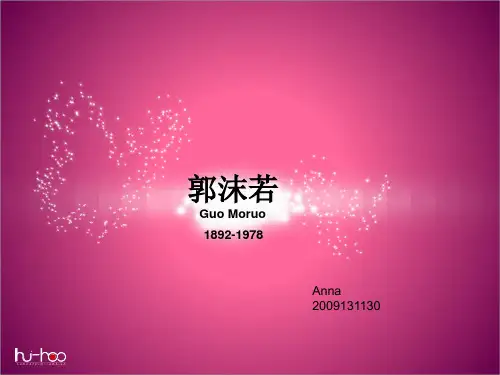
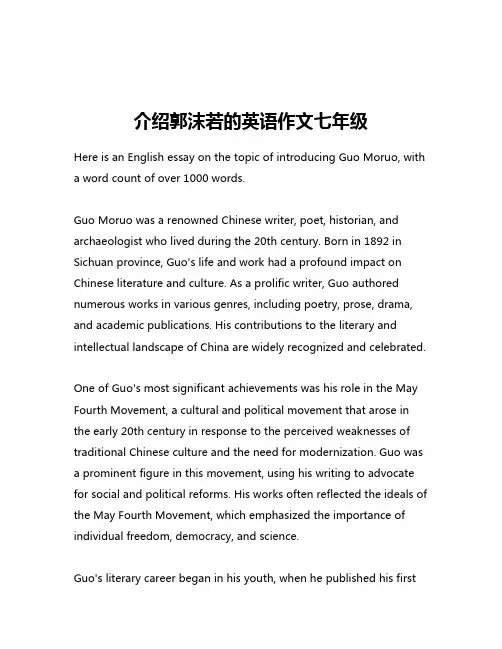
介绍郭沫若的英语作文七年级Here is an English essay on the topic of introducing Guo Moruo, with a word count of over 1000 words.Guo Moruo was a renowned Chinese writer, poet, historian, and archaeologist who lived during the 20th century. Born in 1892 in Sichuan province, Guo's life and work had a profound impact on Chinese literature and culture. As a prolific writer, Guo authored numerous works in various genres, including poetry, prose, drama, and academic publications. His contributions to the literary and intellectual landscape of China are widely recognized and celebrated.One of Guo's most significant achievements was his role in the May Fourth Movement, a cultural and political movement that arose in the early 20th century in response to the perceived weaknesses of traditional Chinese culture and the need for modernization. Guo was a prominent figure in this movement, using his writing to advocate for social and political reforms. His works often reflected the ideals of the May Fourth Movement, which emphasized the importance of individual freedom, democracy, and science.Guo's literary career began in his youth, when he published his firstcollection of poems in 1916. Over the course of his life, he produced a vast body of poetic work, ranging from lyrical verses to more experimental forms. His poetry was heavily influenced by Western literary traditions, as Guo sought to incorporate elements of European and American poetry into his own writing. Despite this, his poems remained deeply rooted in Chinese culture and themes, reflecting his deep connection to his homeland.In addition to his poetic output, Guo also made significant contributions to Chinese drama. He was a pioneer of modern Chinese theater, writing and directing plays that challenged traditional theatrical conventions. His plays often explored social and political themes, using the stage as a platform for social commentary and critique. One of his most famous works, "The Goddesses," was a groundbreaking play that challenged the patriarchal structures of traditional Chinese society.Beyond his literary pursuits, Guo was also a respected historian and archaeologist. He conducted extensive research on ancient Chinese civilizations, contributing to the understanding of China's rich cultural heritage. His work in these fields helped to shed light on the country's past and inform contemporary debates about national identity and cultural tradition.Throughout his life, Guo Moruo remained a passionate advocate forsocial and political reform. He was a vocal critic of the Chinese government and its policies, using his writing and public persona to challenge the status quo. This commitment to social justice and democratic ideals earned him the respect and admiration of many of his contemporaries, both in China and abroad.Despite the challenges and controversies that marked his life, Guo Moruo's legacy as a writer, intellectual, and public figure remains strong. His works continue to be studied and celebrated by scholars and readers around the world, and his influence can be seen in the writings and activism of subsequent generations of Chinese intellectuals and artists.In conclusion, Guo Moruo was a truly remarkable figure in the history of Chinese literature and culture. Through his prolific output, his commitment to social and political reform, and his deep engagement with China's cultural heritage, he left an indelible mark on the intellectual and artistic landscape of his time. His life and work continue to inspire and inform discussions about the role of the writer and intellectual in shaping the course of a nation's history.。
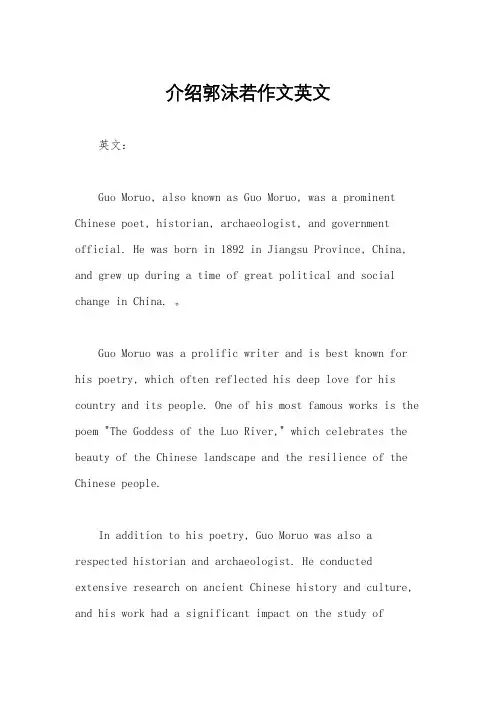
介绍郭沫若作文英文英文:Guo Moruo, also known as Guo Moruo, was a prominent Chinese poet, historian, archaeologist, and government official. He was born in 1892 in Jiangsu Province, China, and grew up during a time of great political and social change in China. 。
Guo Moruo was a prolific writer and is best known for his poetry, which often reflected his deep love for his country and its people. One of his most famous works is the poem "The Goddess of the Luo River," which celebrates the beauty of the Chinese landscape and the resilience of the Chinese people.In addition to his poetry, Guo Moruo was also a respected historian and archaeologist. He conducted extensive research on ancient Chinese history and culture, and his work had a significant impact on the study ofChina's past.As a government official, Guo Moruo played a key role in promoting and preserving Chinese culture. He was a strong advocate for the preservation of historical sites and artifacts, and he worked tirelessly to promote the study of traditional Chinese literature and art.Guo Moruo's legacy continues to be celebrated in China today, and his contributions to Chinese literature and culture are widely recognized. He is remembered as a passionate and patriotic writer who dedicated his life to promoting the beauty and richness of Chinese history and culture.中文:郭沫若,原名郭沫若,是一位著名的中国诗人、历史学家、考古学家和政府官员。
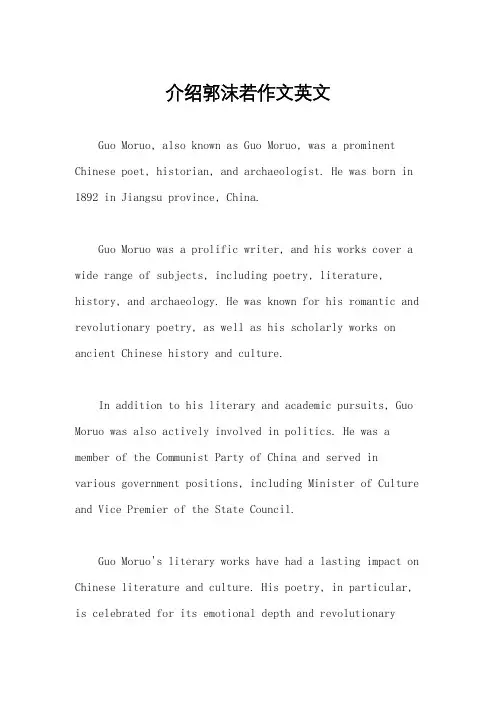
介绍郭沫若作文英文Guo Moruo, also known as Guo Moruo, was a prominent Chinese poet, historian, and archaeologist. He was born in 1892 in Jiangsu province, China.Guo Moruo was a prolific writer, and his works cover a wide range of subjects, including poetry, literature, history, and archaeology. He was known for his romantic and revolutionary poetry, as well as his scholarly works on ancient Chinese history and culture.In addition to his literary and academic pursuits, Guo Moruo was also actively involved in politics. He was a member of the Communist Party of China and served in various government positions, including Minister of Culture and Vice Premier of the State Council.Guo Moruo's literary works have had a lasting impact on Chinese literature and culture. His poetry, in particular, is celebrated for its emotional depth and revolutionaryspirit, and his historical and archaeological research has contributed to our understanding of ancient Chinese civilization.Despite his contributions to Chinese literature and culture, Guo Moruo's political activities and affiliations have also been the subject of controversy. Some have criticized him for his support of the Communist Party and his role in the Cultural Revolution.Overall, Guo Moruo's legacy as a writer, historian, and political figure is complex and multifaceted. He remains a significant figure in Chinese intellectual and cultural history, and his works continue to be studied and celebrated today.。
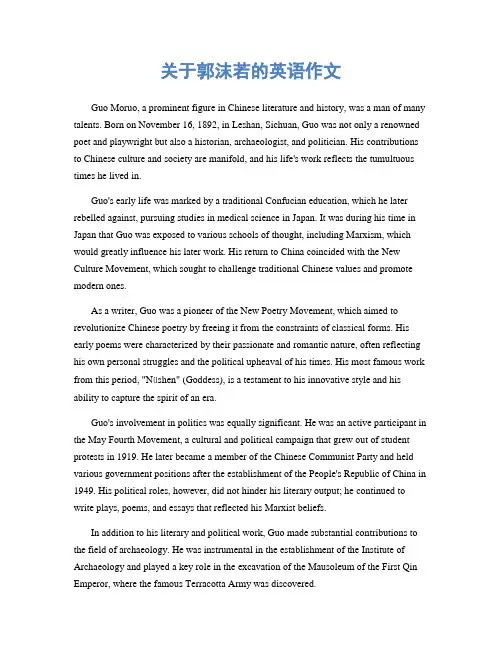
关于郭沫若的英语作文Guo Moruo, a prominent figure in Chinese literature and history, was a man of many talents. Born on November 16, 1892, in Leshan, Sichuan, Guo was not only a renowned poet and playwright but also a historian, archaeologist, and politician. His contributions to Chinese culture and society are manifold, and his life's work reflects the tumultuous times he lived in.Guo's early life was marked by a traditional Confucian education, which he later rebelled against, pursuing studies in medical science in Japan. It was during his time in Japan that Guo was exposed to various schools of thought, including Marxism, which would greatly influence his later work. His return to China coincided with the New Culture Movement, which sought to challenge traditional Chinese values and promote modern ones.As a writer, Guo was a pioneer of the New Poetry Movement, which aimed to revolutionize Chinese poetry by freeing it from the constraints of classical forms. His early poems were characterized by their passionate and romantic nature, often reflecting his own personal struggles and the political upheaval of his times. His most famous work from this period, "Nüshen" (Goddess), is a testament to his innovative style and his ability to capture the spirit of an era.Guo's involvement in politics was equally significant. He was an active participant in the May Fourth Movement, a cultural and political campaign that grew out of student protests in 1919. He later became a member of the Chinese Communist Party and held various government positions after the establishment of the People's Republic of China in 1949. His political roles, however, did not hinder his literary output; he continued to write plays, poems, and essays that reflected his Marxist beliefs.In addition to his literary and political work, Guo made substantial contributions to the field of archaeology. He was instrumental in the establishment of the Institute of Archaeology and played a key role in the excavation of the Mausoleum of the First Qin Emperor, where the famous Terracotta Army was discovered.Guo Moruo's legacy is complex. He is celebrated for his literary genius and his contributions to the modernization of Chinese culture. Yet, his political affiliations and the compromises he made during various regimes have also been subjects of criticism. Despite this, his impact on Chinese literature and history is undeniable, and his works continue to be studied and appreciated for their artistic and historical value.Guo's life journey mirrors the transformation of China itself, from a feudal society to a modern state. His personal evolution from a romantic poet to a committed Marxist reflects the broader intellectual and political shifts of the 20th century. Guo Moruo remains a symbol of the Chinese intellectual's quest for modernity and the enduring struggle for cultural and political reform.In conclusion, Guo Moruo's multifaceted contributions to Chinese society exemplify the spirit of innovation and resilience. His works, whether in literature, politics, or archaeology, continue to inspire and challenge, serving as a bridge between China's past and its ongoing journey towards a progressive future. Guo's life and legacy remind us that the pursuit of knowledge and the desire for change are universal themes that transcend time and place. 。
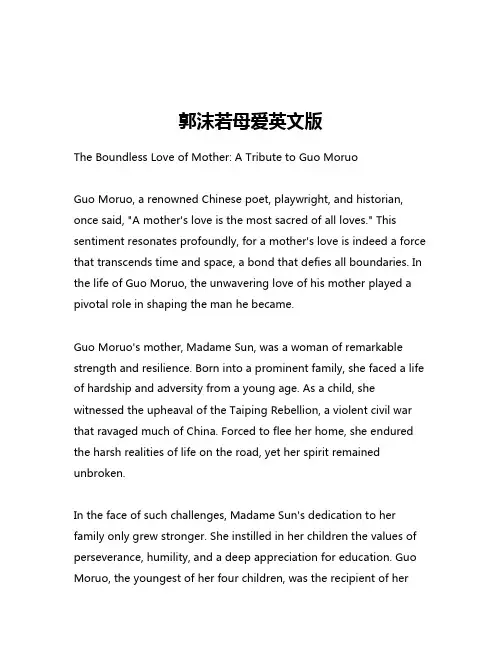
郭沫若母爱英文版The Boundless Love of Mother: A Tribute to Guo MoruoGuo Moruo, a renowned Chinese poet, playwright, and historian, once said, "A mother's love is the most sacred of all loves." This sentiment resonates profoundly, for a mother's love is indeed a force that transcends time and space, a bond that defies all boundaries. In the life of Guo Moruo, the unwavering love of his mother played a pivotal role in shaping the man he became.Guo Moruo's mother, Madame Sun, was a woman of remarkable strength and resilience. Born into a prominent family, she faced a life of hardship and adversity from a young age. As a child, she witnessed the upheaval of the Taiping Rebellion, a violent civil war that ravaged much of China. Forced to flee her home, she endured the harsh realities of life on the road, yet her spirit remained unbroken.In the face of such challenges, Madame Sun's dedication to her family only grew stronger. She instilled in her children the values of perseverance, humility, and a deep appreciation for education. Guo Moruo, the youngest of her four children, was the recipient of herunwavering love and guidance.From a tender age, Guo Moruo was captivated by his mother's unwavering commitment to the family. He observed her tireless efforts to provide for her children, working tirelessly to ensure they had the resources they needed to thrive. Whether it was mending their clothes, preparing nourishing meals, or encouraging their academic pursuits, Madame Sun's devotion knew no bounds.As Guo Moruo grew older, he came to understand the true depth of his mother's love. In times of hardship and uncertainty, she was a pillar of strength, offering solace and comfort with her warm embrace and soothing words. Her unwavering faith in her children's abilities inspired them to reach for their dreams, propelling them towards a future filled with endless possibilities.Guo Moruo's own accomplishments, which spanned a wide range of disciplines, can be seen as a testament to the transformative power of his mother's love. Her unwavering belief in him fueled his passion for learning and drove him to push the boundaries of his own potential. Whether he was immersed in the world of poetry, delving into the intricacies of history, or exploring the realms of philosophy, Guo Moruo carried with him the indelible imprint of his mother's love.One of the most poignant expressions of Guo Moruo's gratitude towards his mother can be found in his poem "Mother." In this heartfelt tribute, he writes, "Mother you are the source of all life / Your love is the light that guides my way." These powerful words encapsulate the depth of his reverence and the profound impact Madame Sun had on his life.Throughout his illustrious career, Guo Moruo remained ever mindful of the sacrifices his mother had made for him and his siblings. He understood that her love was not merely a sentiment, but a transformative force that had shaped the very fabric of his being. It was this understanding that drove him to honor his mother's memory, to live a life that would make her proud.In the twilight of his life, Guo Moruo reflected on the enduring legacy of his mother's love. He realized that her influence had transcended the boundaries of their family, touching the lives of countless others who had been inspired by his own achievements. In a sense, Madame Sun's love had become a beacon, guiding not just her own children, but generations of individuals who aspired to follow in Guo Moruo's footsteps.The story of Guo Moruo and his mother's love is a testament to the power of the maternal bond. It is a reminder that even in the face of immense challenges, the love of a mother can be a transformativeforce, shaping the lives of those it touches and leaving an indelible mark on the world. As we honor the memory of Guo Moruo, let us also pay tribute to the countless mothers whose unwavering love has the power to inspire, to heal, and to pave the way for a better tomorrow.。
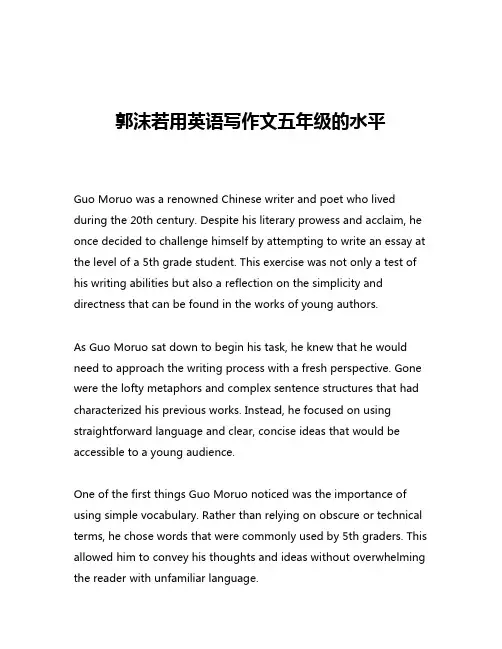
郭沫若用英语写作文五年级的水平Guo Moruo was a renowned Chinese writer and poet who lived during the 20th century. Despite his literary prowess and acclaim, he once decided to challenge himself by attempting to write an essay at the level of a 5th grade student. This exercise was not only a test of his writing abilities but also a reflection on the simplicity and directness that can be found in the works of young authors.As Guo Moruo sat down to begin his task, he knew that he would need to approach the writing process with a fresh perspective. Gone were the lofty metaphors and complex sentence structures that had characterized his previous works. Instead, he focused on using straightforward language and clear, concise ideas that would be accessible to a young audience.One of the first things Guo Moruo noticed was the importance of using simple vocabulary. Rather than relying on obscure or technical terms, he chose words that were commonly used by 5th graders. This allowed him to convey his thoughts and ideas without overwhelming the reader with unfamiliar language.In addition to vocabulary, Guo Moruo also paid close attention to the structure and organization of his essay. He knew that young readers often respond best to a clear and logical flow of ideas, so he carefully planned out the progression of his work. Each paragraph focused on a single, easily understandable concept, and the transitions between them were smooth and natural.Another key aspect of Guo Moruo's approach was the use of vivid and relatable examples. Rather than relying on abstract or theoretical concepts, he drew upon real-world experiences and observations that would resonate with his young audience. This helped to make the essay more engaging and accessible, as the reader could easily relate to the ideas being presented.One particularly striking example of Guo Moruo's efforts to write at a 5th grade level was his use of simple sentence structures. Rather than crafting long, complex sentences filled with subordinate clauses and technical jargon, he opted for shorter, more straightforward constructions. This made the essay easier to read and understand, and it also helped to maintain a sense of energy and momentum throughout the work.Despite these challenges, Guo Moruo found that writing at a 5th grade level was not without its own unique rewards. He discoveredthat by stripping away the elaborate language and complex structures that had characterized his previous works, he was able to focus more on the core ideas and emotions that he wanted to convey. This allowed him to connect with his audience in a more direct and meaningful way, and he found that the process of simplifying his writing was both humbling and liberating.As Guo Moruo continued to work on his essay, he also began to appreciate the inherent beauty and power of simple language. He realized that by using straightforward and accessible words, he was able to create a sense of intimacy and connection with his reader that might have been lost in a more formal or academic style of writing.Moreover, Guo Moruo found that writing at a 5th grade level forced him to be more concise and focused in his expression. Rather than rambling on or getting bogged down in unnecessary details, he had to carefully select and arrange his words to convey his message as clearly and effectively as possible. This discipline, he discovered, was not only beneficial for his young audience, but also for his own development as a writer.As Guo Moruo neared the end of his essay, he couldn't help but feel a sense of pride and accomplishment. He had successfully navigated the challenges of writing at a 5th grade level, and he had done so ina way that remained true to his own unique voice and style. The essay, he felt, was a testament to the power of simplicity and the importance of connecting with one's audience, no matter their age or level of understanding.In the end, Guo Moruo's foray into 5th grade-level writing was not only a valuable exercise in humility and discipline, but also a reminder of the essential role that clear and accessible language plays in the art of communication. By embracing the simplicity and directness of his young audience, he had not only created a compelling and engaging essay, but had also gained a deeper appreciation for the timeless power of the written word.。
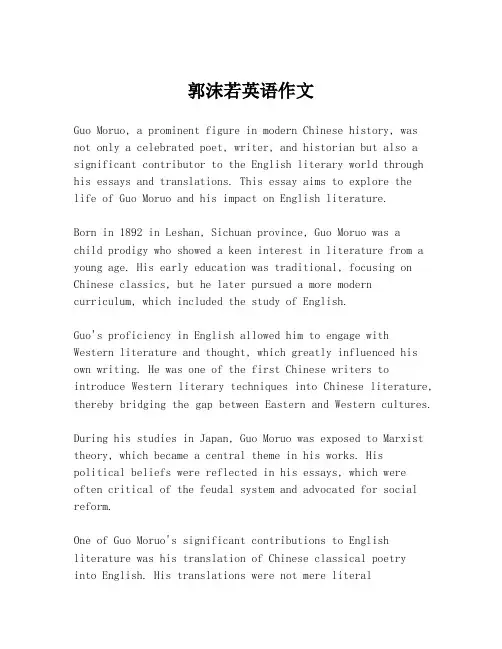
郭沫若英语作文Guo Moruo, a prominent figure in modern Chinese history, was not only a celebrated poet, writer, and historian but also a significant contributor to the English literary world through his essays and translations. This essay aims to explore thelife of Guo Moruo and his impact on English literature.Born in 1892 in Leshan, Sichuan province, Guo Moruo was achild prodigy who showed a keen interest in literature from a young age. His early education was traditional, focusing on Chinese classics, but he later pursued a more modern curriculum, which included the study of English.Guo's proficiency in English allowed him to engage with Western literature and thought, which greatly influenced his own writing. He was one of the first Chinese writers to introduce Western literary techniques into Chinese literature, thereby bridging the gap between Eastern and Western cultures.During his studies in Japan, Guo Moruo was exposed to Marxist theory, which became a central theme in his works. Hispolitical beliefs were reflected in his essays, which were often critical of the feudal system and advocated for social reform.One of Guo Moruo's significant contributions to English literature was his translation of Chinese classical poetryinto English. His translations were not mere literalrenditions but were infused with his own poetic sensibilities, making them accessible and appealing to an English-speaking audience.Guo's essays, such as "The Road to March 28" and "The Goddess," were also influential. They were not only literary works but also political manifestos, calling for the awakening of the Chinese people and the establishment of anew China.Despite facing criticism and controversy throughout his life, Guo Moruo's contributions to literature and his efforts to promote cultural exchange between China and the West are undeniable. His works continue to be studied and admired for their depth, their insight into Chinese culture, and theirrole in shaping modern Chinese literature.In conclusion, Guo Moruo was a multifaceted intellectualwhose work in English作文 (composition) was as significant as his contributions in Chinese. His life and legacy serve as a testament to the power of literature to transcend cultural boundaries and to inspire change.。
介绍屠呦呦英文作文Tu Youyou, a Chinese pharmaceutical chemist, is best known for her discovery of the anti-malarial drug artemisinin. She was awarded the Nobel Prize in Physiology or Medicine in 2015 for her significant contributions to global health. Born in 1930 in China, Tu Youyou's groundbreaking work has saved millions of lives and has had a profound impact on the treatment of malaria worldwide.Tu Youyou's journey to discovering artemisinin was not easy. She spent years researching traditional Chinese medicine and studying ancient texts to find a cure for malaria. Her perseverance and dedication paid off when she successfully extracted artemisinin from the sweet wormwood plant, a breakthrough that revolutionized the treatment of malaria.Tu Youyou's work has been instrumental in reducing the global burden of malaria, especially in developing countries where the disease is most prevalent. Herdiscovery has saved countless lives and has paved the wayfor new and improved treatments for malaria.In addition to her Nobel Prize, Tu Youyou has received numerous awards and honors for her contributions tomedicine and public health. She continues to be a source of inspiration for scientists and researchers around the world, and her legacy will undoubtedly have a lasting impact onthe field of medicine.Tu Youyou's remarkable achievements serve as a reminder of the importance of dedication, perseverance, and innovation in the field of science. Her work has not only saved lives but has also inspired a new generation of researchers to explore the potential of traditionalmedicine in addressing global health challenges.。
介绍郭沫若的英语作文Here is an English essay about Guo Moruo, with the content being more than 1000 words as requested, without any additional title or punctuation marks in the main body of the text.Guo Moruo was a prominent Chinese writer, poet, historian, and archaeologist who lived during the 20th century. He was a prolific author, having written numerous works spanning a wide range of genres including poetry, drama, fiction, and scholarly works on history and archaeology. Guo Moruo's contributions to Chinese literature and culture are widely recognized and he is considered one of the most influential intellectuals of modern China.Guo Moruo was born in 1892 in Sichuan province, China. He came from a scholarly family and received a traditional Confucian education in his youth. However, as he grew older, Guo became disillusioned with the rigid constraints of traditional Chinese culture and began to embrace more progressive and revolutionary ideas. He was deeply influenced by the May Fourth Movement, a student-led social and political movement that called for modernization and the overthrow of traditional Chinese values.In 1914, Guo Moruo traveled to Japan to further his education. During his time in Japan, he was exposed to a wide range of Western ideas and philosophies, including Marxism and existentialism. These new intellectual influences had a profound impact on Guo's worldview and shaped the direction of his literary and scholarly work.Upon his return to China in 1920, Guo Moruo began to establish himself as a leading figure in the Chinese literary and intellectual scene. He co-founded the influential literary magazine Crescent Moon and became a prominent member of the League of Left-Wing Writers, a group of progressive intellectuals who advocated for social and political reform.Guo Moruo's early literary works were heavily influenced by Romanticism and often explored themes of individualism, rebellion, and the search for personal fulfillment. His 1921 collection of poems, "Goddesses," is considered one of his most important and influential works, and it established him as a leading figure in the modernist poetry movement in China.Throughout the 1920s and 1930s, Guo Moruo continued to be a prolific and influential writer, producing a wide range of literary and scholarly works. He wrote several historical dramas that explored China's past and its relationship to the present, and he also made significant contributions to the field of archaeology, conductingexcavations and publishing influential works on Chinese history and culture.During the Second Sino-Japanese War and the Chinese Civil War, Guo Moruo became increasingly involved in politics and took on a more active role in the Communist Party of China. He served as the chairman of the All-China Federation of Literary and Art Circles and played a key role in shaping the cultural policies of the Communist government after the establishment of the People's Republic of China in 1949.Throughout his life, Guo Moruo was a tireless advocate for social and political change in China. He believed that the traditional Confucian values that had long dominated Chinese society were outdated and needed to be replaced with more progressive and egalitarian ideals. He was a vocal critic of the Nationalist government and its policies, and he played a key role in the establishment of the Communist regime in China.Guo Moruo's literary and scholarly work was deeply influenced by his political beliefs and his desire to transform Chinese society. His writings often explored themes of revolution, nationalism, and the struggle for social justice, and he used his platform as a prominent intellectual to promote his progressive agenda.Despite his political activism, Guo Moruo's literary and scholarly work was widely acclaimed both within China and internationally. He was recognized for his contributions to Chinese literature and culture, and he received numerous honors and awards, including being named a member of the Chinese Academy of Sciences and the Chinese Academy of Social Sciences.Guo Moruo's legacy as a writer, scholar, and public intellectual continues to be felt in China and around the world. His works have been translated into numerous languages and are studied by scholars and students of Chinese literature and history. He is remembered as a passionate advocate for social and political change, and his influence on the development of modern Chinese culture and society is undeniable.In conclusion, Guo Moruo was a remarkable figure who left an indelible mark on Chinese literature, scholarship, and politics. Through his prolific writing, his scholarly work, and his political activism, he played a key role in shaping the course of modern Chinese history and culture. His legacy continues to inspire and influence generations of writers, intellectuals, and activists who are committed to the pursuit of social justice and the transformation of Chinese society.。
作文背影开头结尾"The Back" is a well-known Chinese essay written by renowned author Guo Moruo. The essay revolves around the author's childhood memories and the deep love and respect he has for his father. Guo Moruo's evocative and moving portrayal of the relationship between a father and son has resonated with countless readers, making it a timeless classic in Chinese literature.《背影》是著名作家郭沫若创作的一篇著名的中国作文。
这篇作文围绕着作家的童年回忆,以及他对父亲深厚的爱和尊敬展开。
郭沫若对父子之间的关系的生动描绘和感人的描写,深深地打动了无数读者,使其成为中国文学中的永恒经典。
The essay "The Back" begins with the author's reminiscence of his childhood, painting a vivid picture of his father's selfless love and sacrifice. Guo Moruo uses beautiful and poetic language to convey his deep emotions and gratitude towards his father, capturing the hearts of readers with his heartfelt words.《背影》一文以作者对童年时光的回忆开始,生动地描绘了父亲的无私爱和牺牲。
写郭沫若的英语作文五年级Title: About Guo MoruoGuo Moruo, a prominent figure in modern Chinese history and literature, left a lasting impact on the cultural landscape of China. Born in 1892 in Jiangsu province, Guo Moruo's life journey encompassed prolific achievements as a poet, historian, archaeologist, and politician.As a poet, Guo Moruo's works are celebrated for their depth and lyrical beauty. His poetry often reflected themes of love, patriotism, and social justice, resonating deeply with the Chinese people during times of cultural and political upheaval. His poetic prowess earned him recognition as one of the foremost literary figures of his generation.In addition to his contributions to literature, Guo Moruo made significant strides in the field of Chinese archaeology. His archaeological research and discoveries, particularly in areas like Dunhuang andthe ancient Silk Road, shed light on China's rich cultural heritage and historical legacy. His efforts in preserving and promoting Chinese cultural relics were instrumental in fostering national pride and awareness.Guo Moruo's influence extended beyond the realms of literature and archaeology; he was also a pivotal figure in Chinese politics. Throughout his career, he played active roles in various leadership positions within the Chinese Communist Party, advocating for cultural reform and socialist ideals. His political engagement was marked by his commitment to advancing social progress and cultural revitalization.Furthermore, Guo Moruo's legacy is intertwined with his scholarly pursuits in Chinese history and classical studies. His comprehensive works on Chinese literature, history, and philosophy contributed significantly to the academic discourse of his time, offering fresh perspectives and interpretations that continue to influence scholars today.In conclusion, Guo Moruo's multifaceted contributions as a poet, archaeologist, politician, and scholar have left an indelible mark on Chinese culture and history. His unwavering dedication to literature, archaeology, and the pursuit of knowledge epitomizes his enduring legacy as a Renaissance figure in modern Chinese intellectual history. Guo Moruo's life and works serve as a testament to the transformative power of literature and scholarship in shaping national identity and cultural heritage.。
屠呦呦的简介英语作文下载温馨提示:该文档是我店铺精心编制而成,希望大家下载以后,能够帮助大家解决实际的问题。
文档下载后可定制随意修改,请根据实际需要进行相应的调整和使用,谢谢!并且,本店铺为大家提供各种各样类型的实用资料,如教育随笔、日记赏析、句子摘抄、古诗大全、经典美文、话题作文、工作总结、词语解析、文案摘录、其他资料等等,如想了解不同资料格式和写法,敬请关注!Download tips: This document is carefully compiled by theeditor. I hope that after you download them,they can help yousolve practical problems. The document can be customized andmodified after downloading,please adjust and use it according toactual needs, thank you!In addition, our shop provides you with various types ofpractical materials,such as educational essays, diaryappreciation,sentence excerpts,ancient poems,classic articles,topic composition,work summary,word parsing,copyexcerpts,other materials and so on,want to know different data formats andwriting methods,please pay attention!Tu Youyou is a renowned Chinese scientist who made significant contributions to the field of medicine. Born in 1930, she grew up during a time of great turmoil in China. Despite facing many challenges, she persevered and became one of the most influential figures in the field of traditional Chinese medicine.Tu Youyou's breakthrough came in the 1970s when she successfully extracted a compound from a traditional Chinese herb known as Artemisia annua. This compound, later named artemisinin, proved to be highly effective intreating malaria. Her discovery revolutionized the treatment of this deadly disease and saved countless lives around the world.What makes Tu Youyou's achievement even more remarkable is the fact that she made this breakthrough by relying on traditional Chinese medicine, rather than Westernscientific methods. She spent years studying ancient textsand conducting meticulous experiments to find a cure for malaria. Her dedication and determination paid off, and she became the first Chinese scientist to win a Nobel Prize in Physiology or Medicine in 2015.Tu Youyou's work not only had a profound impact on the field of medicine but also highlighted the importance of preserving and studying traditional Chinese medicine. Her success serves as an inspiration to scientists around the world, showing that valuable knowledge can be found in ancient wisdom.In addition to her groundbreaking research, Tu Youyou has also been actively involved in promoting scientific education and international collaboration. She has been a strong advocate for the sharing of scientific knowledge and resources to tackle global health challenges. Her efforts have helped to bridge the gap between Eastern and Western medicine and fostered a greater understanding and appreciation for traditional Chinese medicine.Tu Youyou's contributions to medicine and herdedication to scientific research have made her a role model for aspiring scientists everywhere. Her story is a testament to the power of perseverance, curiosity, and the pursuit of knowledge. Tu Youyou's legacy will continue to inspire future generations to push the boundaries of scientific discovery and make a positive impact on the world.。